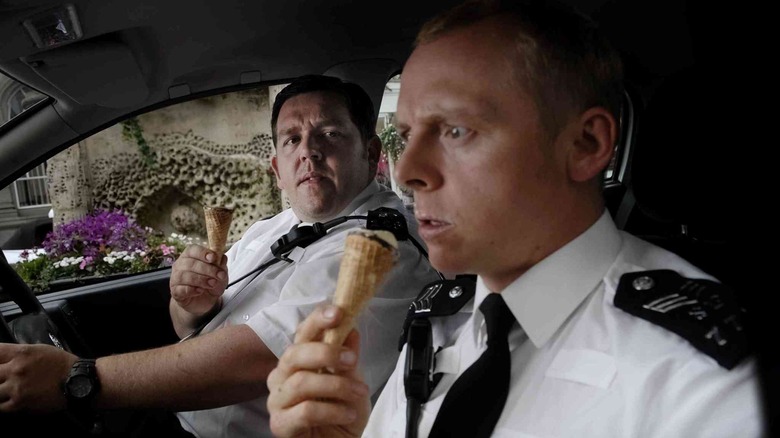How Teenage Boredom Inspired Edgar Wright's Cornetto Trilogy
Ask a wildly talented filmmaker with oddball sensibilities about the inspirations and influences that went into their most personal films, and you'll likely get some unexpected answers in return. Like all art, making movies that truly stand out sometimes requires the absolute best at their craft to put a few pieces of themselves into the stories they create. Whether such introspection actually registers in the minds of every casual viewer, or merely those who are already most invested in the fairly complicated details of the filmmaking process, the results can be equally as affecting among anyone who shares even just the smallest overlap between their life experiences and the director's own.
You might be tempted to think that this description would apply most vigorously to a certain type of serious-minded director like Terrence Malick or Martin Scorsese, whose art most obviously reflects their own particular life concerns. But who's to say that this can't also remain true for those with a slightly different — though no less valid — set of sensibilities?
Director Edgar Wright made quite a name for himself among movie lovers with the release of his Cornetto Trilogy over the span of almost a decade, all starring actors Simon Pegg and Nick Frost in some of the most gleefully imaginative and oh-so-British romps you'll ever see. Because of the irreverent and, at times, even slapstick comedy tones of these films, fans might not be predisposed to considering just how personal they may be, even when all three titles boast some incredibly rich and layered ideas running just underneath the surface. As Wright recently explained, the same holds true even for more recent efforts like the horror period piece, "Last Night in Soho."
'You're dramatizing your own mundane experiences into something more exciting'
In a recent talk with Interview Magazine, Edgar Wright reminisced about the admittedly varied premises of a few of his most well-known films and the mildly surprised reactions he receives when informing others of how personal they are to him. Wright said:
"Oh, yeah. That's what's strange — 'Shaun of the Dead' is a film about a zombie apocalypse, 'Hot Fuzz' is a film about cops in Somerset, 'Last Night in Soho' is about a Cornish fashion student coming to London with supernatural powers — and I say, 'Oh, they're all really personal.' [Laughs] People are like, 'How?' But you do put yourself into them, and you're dramatizing your own mundane experiences into something more exciting."
Fittingly, a recurring theme throughout his Cornetto Trilogy (and, in fact, many of his other films as well) involves the need for stunted characters to grow up, accept their different stations in life, and try to come to terms with the new and unfamiliar settings they find themselves in. Not all his characters are successful at navigating these struggles, but it's clear that much of this comes from Wright's own upbringing, including his own teenage boredom, as it turns out. He goes on to say:
"...I grew up in Dorset and Somerset, so a lot of what I've done is the product of being bored as a teenager. Somerset is a very picturesque and beautiful place, but when you're a teenager, picturesque is not what you want — you want to get to the city. Now I'm older, and I think more fondly about my bucolic childhood in the country. So, all of the things you make become like love/hate letters to the place that you're from."
So far, Wright has proven exceptionally adept at putting his own unique stamp on films that, at first glance, hardly seem to have anything to do with one another. But to hear him tell it, every shared quality between them starts from the most intimately personal place. And maybe a little ennui thrown in there, for good measure.

